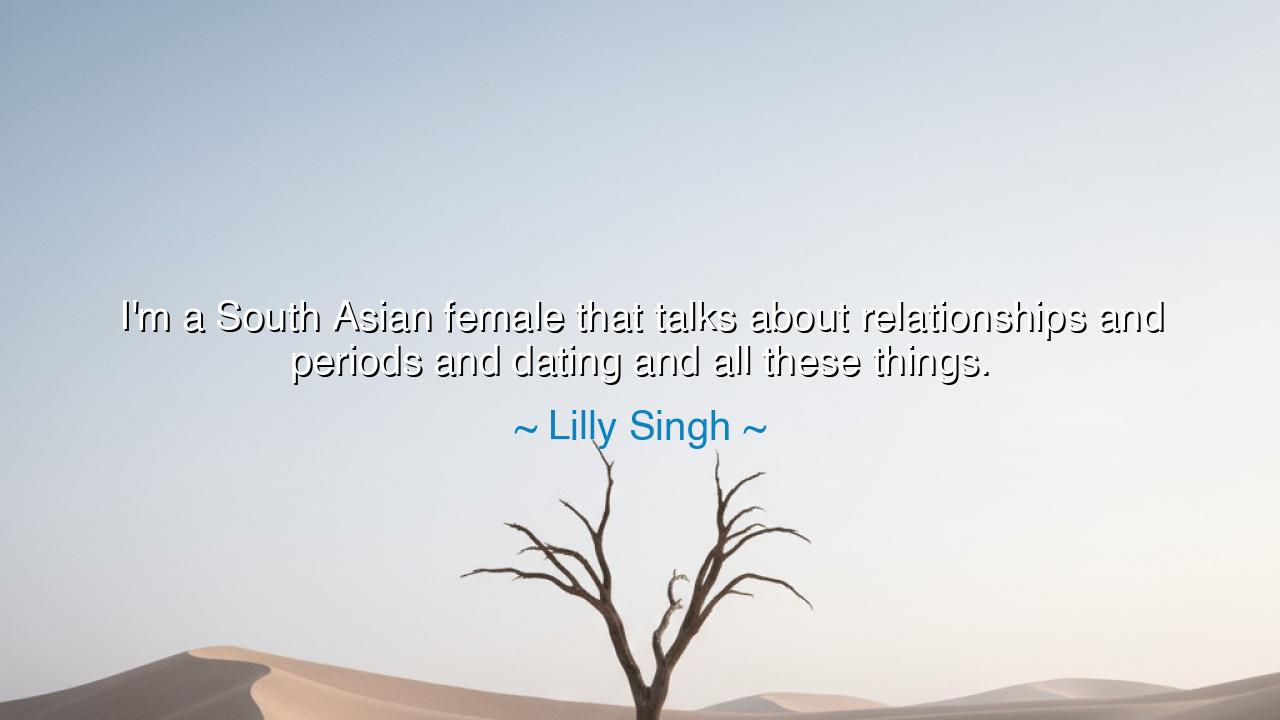
I'm a South Asian female that talks about relationships and
I'm a South Asian female that talks about relationships and periods and dating and all these things.






In the councils of voice and memory, a young herald stands and names herself plainly: “I’m a South Asian female that talks about relationships and periods and dating and all these things.” Hear the courage in the inventory. It is not mere self-description; it is a banner planted on contested ground. To speak the body, the heart, and the unglamorous mechanics of life—especially as a South Asian female—is to pry open rooms long shut by silence and shame. The sentence declares: I will not let my story be footnoted; I will put it on the first page.
To say “I talk about relationships” is to bring private script into daylight, where patterns can be mended instead of secretly repeated. To say “I talk about periods” is to break a hush that has taxed girls with embarrassment and kept women from health and schooling. To say “I talk about dating” is to place desire among respectable words, where it can be guided, not merely policed. And to add “and all these things” is to remind us that culture is built of the everyday: the messy, mortal details that great epics often skip, though they are the very soil in which freedom grows.
This declaration has an origin in both biography and lineage. It is the signature of a comedian and storyteller who found her stage on digital streets and then carried it into wider halls; but it is also heir to a longer tradition of South Asian women who risked censure to speak whole truths. Think of Ismat Chughtai, who wrote “Lihaaf” and stood trial rather than relinquish a woman’s interior life to silence. Think of the innovators and activists who dragged menstruation from taboo to policy and product—voices saying, in effect: “We will name what sustains us.” Singh’s sentence stands in that procession, updating the banner for an age of cameras and comments.
Consider a true story set closer to the ground. A student club hosted an open mic where a freshman—brown-skinned, soft-voiced—read a piece about hiding pads in sleeve cuffs and the double standard of “good girls don’t date” versus “why are you still single.” The room laughed, then quieted. Afterward, veterans of the campus—athletes, engineers, a professor—lined up to say, “Thank you. I thought it was just me,” or “I never knew; now I do.” The poem did not change policy that night. It changed posture—the way people sat with one another’s truths. From posture, policy can grow.
History beyond the subcontinent hums the same wisdom. Sappho named desire in an age that preferred it nameless; Sojourner Truth asked, “Ain’t I a woman?” when womanhood was fenced by race; Frida Kahlo painted pain in colors that refused pity. Each, like Singh, insisted that the “small” particulars—the body that bleeds, the love that flares, the quarrel that repeats—are not trivia but testimony. When a South Asian female holds the mic and speaks of relationships, periods, dating, she widens the human archive and narrows the old alibi of ignorance.
What, then, is the lesson to pass down? That dignity multiplies when the unspoken is spoken well. That comedy and candor can be twin midwives, delivering heavier subjects without breaking the listener. That representation is not decoration but infrastructure: a bridge by which a girl in a quiet apartment can cross to a future where her truths are ordinary and her choices are her own. The work is not to shock for spectacle, but to normalize with courage—until the room no longer flinches at the word periods, and no one’s worth is negotiated at the price of her silence.
Let the counsel be simple and brave. Name your things—the ones you were taught to hide—and name them responsibly: with facts, with empathy, with craft. Build circles where relationships can be discussed without derision and where dating is shaped by consent, reciprocity, and respect. Push for practical decency: period products in restrooms, curricula that teach bodies without shame, workplaces that treat care as labor and not as liability. Amplify South Asian and other marginalized voices not as tokens but as teachers; share stages, cite sources, pay people.
Finally, keep your voice lithe and your heart kind. Humor disarms; honesty roots; repetition normalizes. If you have a platform, use it to make someone else’s first sentence easier to say. If you are just beginning, start where you stand: one conversation at a family table, one post, one poem, one policy ask. In time, the chorus will rise, and the old hush will thin like fog at noon. Then a young South Asian female will speak of relationships, periods, dating, and all these bright human things—and the room will simply nod, as if to say, “Of course.”






AAdministratorAdministrator
Welcome, honored guests. Please leave a comment, we will respond soon